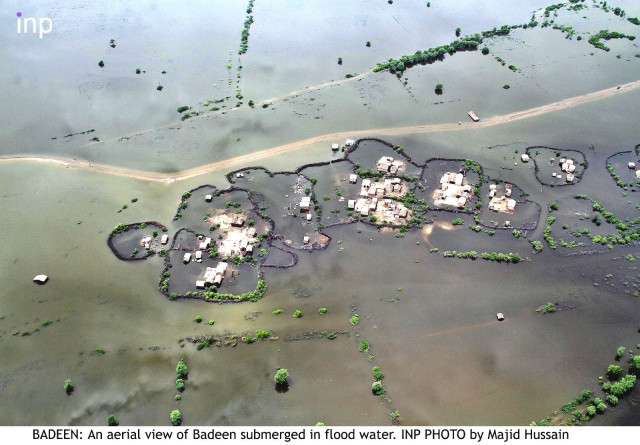All that remains: Though the first to drown, Badin still awaits aid
Residents of the district tell stories that put NGOs and the government claims to shame.

Among them, sat Hasaan Baksh, a nine-year-old boy. “I want to go home,” cried the under-dressed and clearly underfed child. He was, however, too young to comprehend that he no longer had one.
“I own 94 acres of land across Badin,” said Raja Farhat Javaid, while sternly surveying the villagers during the demonstration on how to use sanitation gear provided by the Laar Humanitarian and Development Programme (LHDP). “In all my lands, not a single drop of clean drinking water has been provided,” he said. “My heart goes out to the villagers and their families - enough for me to spend my days with them in the rain.” According to him, NGOs that were helping them recently asked for their water barrels back. For him this is favouritism at work, not charity.
His firm stance towards the management of an ever-growing number of villagers anxiously awaiting aid, rapidly morphed into the plea of a desperate individual. “No media representatives or government officials have visited any villages in the lands I own,” he said, with tears streaming down his face. “Whether or not our struggle gets effective national or international coverage, I am in debt to the individuals who have travelled here today to see our deterioration first hand. It is more than I could have asked for.”
Close by is a village named Bachal Hamdani Goth, one of the many including Azad Kashmir Chowk and Kolachi Goth, that are encircled by water. “Only God knows what their condition is as it is impossible to travel to them,” said Javaid, looking up as black rainclouds hastily reintroduce themselves to the sky. “According to recent information, they have attempted to evacuate but have no place to bury their dead.”
Locals complained that the mobile medical teams were reusing syringes. “Regardless of the illness, they are injecting us with one medicine and all of us are being injected with the same syringe,” said Javaid.
“This is a bottle of Dettol antibacterial,” explained Shujauddin Saifi, an LHDP worker while sifting through a white bag containing 30 basic hygiene items, including towels, clean clothes, nail cutters and anti-lice hair shampoo.
“What is this?” Saifi asked his audience, checking for absorption.
“A bottle of Dettol,” replied the villagers in a single tone similar to children being taught the alphabet in a classroom. Saifi goes on to explain how to use it.
Just three miles down, another demonstration was under way. But this time, a non-violent obstruction of the road by famished families. “We have not received an ounce of food or water from any organisation in the district,” cried out Manzoor Husaini, cupping his palms like a beggar. “Please feed us,” he yelled. “We have not eaten in days!”
Allah Rakhio Ahmdani, an army officer, explained that they were tirelessly working to restore some form of sanity in the area. “We have rescued over 1,500 families,” he said while swiftly being interrupted by an angry member of the crowd: “What do you do after you save these lives? You bring them to the road and leave them there to rot away.”
Past the demonstrations, travelling towards Tharparkar, was a horizontal cut in the road that has caved in. Here, stood a businessman with his donkey cart. “My donkey left this accursed land one week ago, I will however, honour its work,” quipped Vikesh. “Fifty rupees to take your motorcycle across the dip and Rs25 to transport your animals,” he chanted in monotone. After loading two motorcycles on to his cart, he was off, carrying the load of a vehicle and a donkey cart. His father had died just three days earlier.
On this stretch, although every traveller’s story was unique, every loss took on a different scale. But there was one thing in common. People migrating from Tharparkar swore that there was nothing left to stay for. The people of Badin, travelling to Tharparkar, shared a similar story.
An emergency is declared if 250mm of rain falls. In Badin it was 550mm. Cotton, rice and sugarcane are among the crops entirely devastated. Milk is non-existent.
On an average, an adult requires over 2,000 calories a day to stay healthy, explains Dr Shankar Laal, a doctor working with an NGO in Tharparkar.
Over 90% of the people there receive less than 1,200 calories a day. Pregnant women are among the starving population leading to a rise in infant mortality. Over 1.5 million babies have died after premature births lead to the deprivation of oxygen. For people fortunate enough to journey to an area with these medical facilities, they are met with hours of waiting in line. “Most health facilities welcome over 300 people daily,” said Fazal Memon, a doctor working in Pangrio. “We have no electricity or clean water here. We must try to sleep while being harassed by mosquitoes all night. If we get sick who will look after the rest of the people?”
Treatment efforts do not begin to meet the level at which they are required. For an estimated 150,000 people; there are two civil hospitals and six functional health units available.
Published in The Express Tribune, September 17th, 2011.



















COMMENTS
Comments are moderated and generally will be posted if they are on-topic and not abusive.
For more information, please see our Comments FAQ